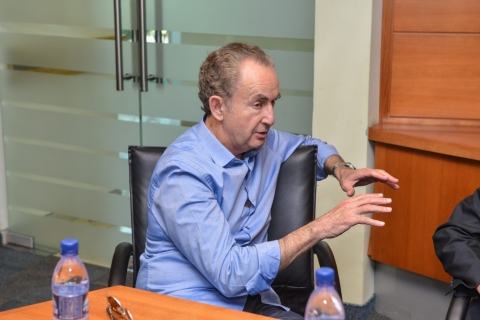Science central
People behind the science

The new Schwartz-Reisman Science Education Centers are poised to change the future of high school science education in Israel
Earlier this year, Gerry Schwartz and Heather Reisman of Toronto made a magnanimous gift - the single largest in Weizmann Canada’s 50-year history - that establishes a series of science education centers in Israel for outstanding high school youth. In doing so, Mr. Schwartz and Ms. Reisman hope to transform the way students learn science, and, it is hoped, offer a template for science education centers worldwide.
The gift establishes the new Schwartz-Reisman Science Education Center in Rehovot, adjacent to the Weizmann Institute; an additional center to be built in Rishon LeZion; and most likely another one at a different location in Israel. The centers are based on the model of a successful, longstanding science education center in Tel Aviv that the couple has generously funded as well, at which top-notch science-oriented students from Tel Aviv high schools do advanced coursework in chemistry and physics to prepare for their matriculation exams in those subjects.
The concept, he says, is similar to that of the HESEG Foundation, which he and his wife established in 2005, because both ultimately help ensure the future of Israel. HESEG, which is based in Tel Aviv, offers tuition and living expenses for former lone soldiers who wish to stay in Israel after their service in the Israel Defense Forces. “We feel that these young people have not only volunteered to defend the State of Israel, which is humbling in and of itself—leaving their homes and their families and everything they know and love to serve in the Israeli army—but that they are defending the Jewish people all over the world. We want these individuals to advance academically and thereby ensure their own futures in Israel,” he says.
The impetus to nourish science education, meanwhile, originates from the same sentiment. “Science education is critical because strong science and industry will create a stronger Israel,” he says.
“We are incredibly inspired by Daniel’s vision and believe that the high school years are a very formative period during which young people develop their brain power, their curiosity, and their passion for future endeavors,” says Heather Reisman. “Any small role we can play in contributing to the development of human potential for future success in Israel is compelling to us, and we are grateful for the opportunity to be involved.”
Gerry Schwartz, a native of Winnipeg, is founder, Chairman, and CEO of Onex Corporation, one of Canada’s 10 largest companies. Heather Reisman is founder and CEO of Indigo Books & Music Inc. They are major supporters of a number of Canadian Jewish organizations. “Both Heather’s family and mine have cared about Israel enormously throughout the decades, so devoting our philanthropy to Israel is natural and obvious,” he says.
Mr. Schwartz made his first visit to the Weizmann Institute campus in June. “It knocked me out,” he says. “The campus is more beautiful and its buildings and labs more sophisticated than I expected—and I expected a lot,” he admits.
A model worth replicating
Planning for the Schwartz-Reisman Center in Rehovot is well underway; groundbreaking on the new facility, the Ruth and Uriel Arnon Science Education Campus, will take place later this year at a location next to the Davidson Institute for Science Education, on land provided by the Rehovot municipality. Programming has been operating since 2013 at the Davidson Institute. Already, the Center caters to over 600 highschool students in 23 classes from seven feeder schools in Rehovot and Ness Ziona.

Architectural rendering of the new Schwartz-Reisman Center in Rehovot
These students benefit from highly trained teachers with advanced science degrees who form a vibrant intellectual community; state-of-the-art lab equipment that any single school cannot offer; and courses at the highest levels of sophistication. The Rehovot facility will include 18 designed “class-labs” equipped with the most advanced materials and equipment, preparation rooms for teachers and lab assistants, and a Fabrication Laboratory (a so-called “Fab Lab”) where students can create tools and parts for experiments from scratch using 3D printers, laser cutters, circuit board printers, and more.
The goal of the Schwartz-Reisman Science Education Centers, says President Prof. Daniel Zajfman, is both to increase the interest of the high school kids in science and to provide them a place where they can study physics and chemistry at the highest level, under the best possible conditions. Thus, when they finish high school, “they will know that scientific knowledge is not only critical and valuable, but that the world is full of scientific wonders.”
He continues, “Both Gerry and Heather understand the value of science education in general, and how critical it is for the state of Israel. By providing this major support to the establishment of the Schwartz-Reisman Science Education Centers, they are leveraging considerably our ability to improve the quality of science education and provide a better future for the children, since it is well known that a high level of scientific literacy is one of the best predictors of their future success.”
At the Center in Rehovot, says a tenth grade student at Ben-Gurion High School in Ness Ziona, “Scientific methods are learned through experiments. Because we use this active learning method, we learn more effectively and we connect to the material and understand it better than in the typical school setting where we usually learn from a book.”
The fabulous Fab Lab
Science has become sophisticated—which means that learning science must take a parallel leap. The planned Fab Lab of the new Schwartz-Reisman Center is considered its crown jewel. Located on the first floor across from the main entrance, this unique space will house state-of-the-art machinery and equipment. Based on an existing model at the Massachusetts Institute of Technology—which was the first in a series of what has now gone global—it is expected to revolutionize experiments and activities.
The Fab Lab is a modern production room in which teachers and students are able to design tools for experiments and competitions utilizing computers. MIT’s Fab Lab was created to support innovation and entrepreneurship in technology and device creation; some 300 Fab Labs now exist in 30 countries. They are comprised of industrial-grade fabrication and electronics tools (3D printers, laser cutters, circuit boards printers, etc.), with software and programs written by MIT researchers.
Fab Labs are beginning to be adopted by schools as platforms for project-based, hands-on science, technology and engineering education (STEM), with students learning through creating, and thus gaining deep knowledge about the machines, materials, design processes, and engineering that goes into invention and innovation.
The HESEG Foundation
At any given time, some 6,000 lone soldiers are serving in the Israel Defense Forces. These young men and women are living in Israel without their immediate family and therefore have little or no support system at a critical moment: after making aliya and during the challenging period of army service. The HESEG Foundation, established by Gerry Schwartz and Heather Reisman in 2005, provides tuition scholarships for former lone soldiers— individuals who completed their army service and wish to enroll in higher education studies in Israel. “Heseg” is the Hebrew word for achievement.
HESEG also offers a mentoring program to assist scholarship recipients and alumni in charting their career paths. It hosts holiday events for the recipients and other social and professional networking opportunities and serves the community of HESEG alumni in a myriad of ways.
In 2006, during Israel’s second war in Lebanon, Mr. Schwartz and Ms. Reisman donated 100 mobile air conditioning units to provide relief for residents of northern Israel forced to live in bomb shelters.
In establishing and funding HESEG, says Ms. Reisman, “we are supporting the commitment of truly outstanding individuals who have taken a great responsibility upon themselves and give of themselves for the future of Israel.”

Gerry Schwartz on campus in June








